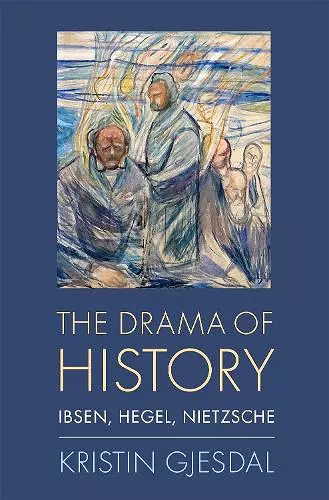The Drama of History
Ibsen, Hegel, Nietzsche
Format:Hardback
Publisher:Oxford University Press Inc
Published:5th Jan '21
Currently unavailable, and unfortunately no date known when it will be back

Henrik Ibsen's plays have long beguiled philosophically-oriented readers. From Nietzsche to Adorno to Cavell, philosophers have drawn inspiration from Ibsen. But what of Ibsen's own philosophical orientation? As part of larger European movements to reinvent drama, Ibsen and fellow playwrights grappled with contemporary philosophy. Philosophy of drama found a central place with figures such as Gotthold Ephraim Lessing and Johann Gottfried Herder, but reached its mature form, in Ibsen's time, in the works of G.W.F. Hegel and Friedrich Nietzsche. Kristin Gjesdal reveals the centrality of philosophy of theater in nineteenth-century philosophy and shows how drama, as an art form, offers insight into human historicity and the conditions of modern life. The Drama of History deepens and actualizes the relationship between philosophy and drama--not by suggesting that either philosophy or drama should have the upper hand, but rather by indicating how a sustained dialogue between them brings out the meaning and intellectual power of each. Her study reveals underappreciated aspects of Hegel's and Nietzsche's works through their reception in European art and investigates the philosophical dimensions of Ibsen's drama. At the heart of this interrelation between philosophy and drama is a shared interest in exploring the existential condition of human life as lived and experienced in history.
Gjesdal's book is erudite, precise, and rich in detail, yet still elegant and accessible...Gjesdal shows how the characters in Ibsens plays, more than representing certain philosophical ideas, actively demonstrate how these ideas might play out in an embodied life... Gjesdal's work is not just yet another testimony to the greatness of Ibsen's writing. Her purpose is more pointedly to show that drama can develop philosophical thought in ways that philosophy on its own perhaps cannot... Gjesdal's book makes for essential reading for anyone interested in the complex relationship between drama and philosophy in the nineteenth century, and for those seeking to free philosophical reflection from the confines of academic discourse in the twenty-first. * Alice Lagaay, Hamburg University of Applied Sciences, Modern Drama *
The scope of Gjesdal's work is monumental. She writes across almost the entire arc of Ibsen's oeuvre, a century of European philosophy, and the scholarly traditions of (at least) three languages...As valuable as Gjesdal's meticulous research is, the new interpretive possibilities she raises are an even greater critical contribution, not only for philosophers but for theatre scholars and practitioners as well. * Theatre Survey *
The Drama of History deftly explores the synergy between drama and philosophy in 19th-century Europe as it finds expression in Henrik Ibsen via two of the leading thinkers of the age, Hegel and Nietzsche. Gjesdal...considers this particularly in terms of the trio's orientation to the unfolding of history in an age when new disruptive values supplanted the staid traditional norms that had governed human relations for centuries...Gjesdal reads seven Ibsen plays against the Hegelian and Nietzschean intellectual backdrop that dominated the Continent. Her interest is in determining not so much how Ibsen reflected these novel yet frequently unsettling ideas in his plays but how he grappled with them philosophically in order to forge a coherent and defensible world view. Gjesdal is especially adept at showing how Ibsen crafted psychologically complex characters who sought authentic rather than aestheticized selves...Recommended. Upper-division undergraduates through faculty. * CHOICE *
Kristin Gjesdal has already published a long series of articles and one anthology on the philosophical impact of Ibsen's dramatic works. With the present volume she delivers a more comprehensive and more deeply analyzed study on the subject that focuses on Ibsen's discussion of the philosophy of history...I hope that my attempt to paraphrase the findings of the study indicates the originality of its perspective and the richness of its findings. All in all, the study offers one of the most interesting studies on Ibsen and philosophy to date...Looking at the sophisticated findings one could assume that the book is hard to read and to understand. The opposite holds true. Gjesdal's study is characterized by a highly transparent argumentation and a prose style that deserves the old rhetorical laud of clarity. * Ibsen Studies *
Kristin Gjesdal's The Drama of History: Ibsen, Hegel, Nietzsche is a rich exploration of Hegelian and Nietzchean themes in and through Ibsen's work. Ibsen (1828–1906) was born shortly before Hegel's death (1831) and was a contemporary of Nietzsche (1844–1900). Some of Ibsen's best-known plays – A Doll's House, Ghosts, The Wild Duck – premiered during Nietzsche's most active period of philosophical writing. Gjesdal'sbook is also a window onto Hegel's and Nietzsche's 19th-century reception in Scandinavia, and their place in literary and artistic circles. That said, Gjesdal's book is not just about charting influence. This makes the study especially interesting andphilosophically rich... Gjesdal reads the plays as taking up Hegelian and Nietzschean themes, yet complicating and challenging them, in such a way as not only to have Hegel and Nietzsche shed light on Ibsen but also to have Ibsen shed light onHegel and Nietzsche. * Analysis *
Kristin Gjesdal has written a lucid, fascinating book that will be valuable both for literary scholars and for philosophers. Without in the slightest sacrificing attention to the distinctive literary dimensions of Ibsen's work, she shows in unusual detail how his dramas bear on modern historical self-consciousness and on philosophers concerned with the same problems of historicity, like Hegel and Nietzsche. The Ibsen who emerges from her study is as compelling a thinker as he is a dramatist. * Robert B. Pippin, The Evelyn Stefansson Nef Distinguished Service Professor of Philosophy and Chair of The John U. Nef Committee on Social Thought, The University of Chicago *
ISBN: 9780190070762
Dimensions: 152mm x 236mm x 25mm
Weight: 544g
246 pages